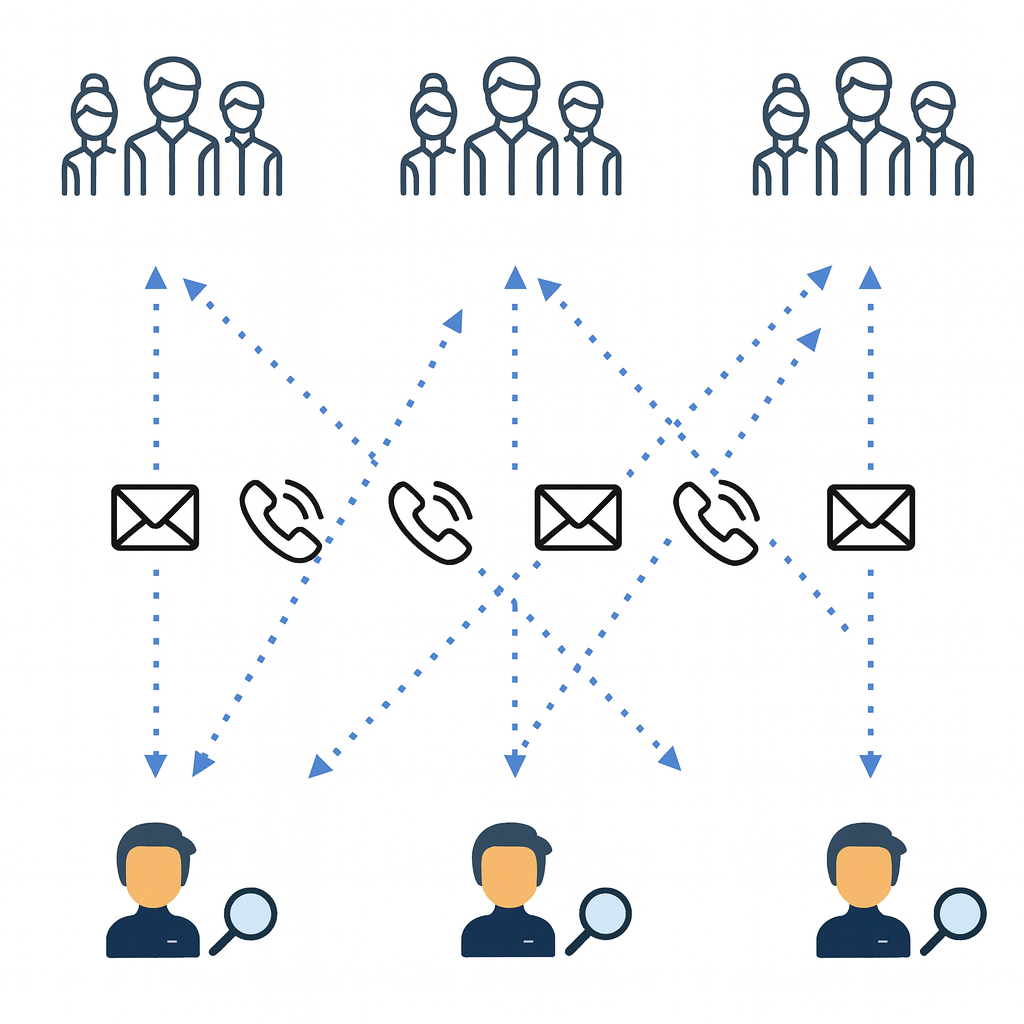
What Is an Expert Network?

In simple terms, an expert network is a service that finds and vets subject-matter experts – for example, former executives, buyers, channel partners, competitors, or other operators – and connects them with clients seeking insight. The core offering is usually a one-on-one expert call, where a client (like a private equity investor or consultant) spends an hour interviewing an expert to gain proprietary knowledge. Many expert networks also facilitate other formats such as B2B surveys (to get quantitative validation from dozens or hundreds of experts), extended engagements (e.g. expert placements for note-taking, short-term projects, or workshops), and even transcript libraries (searchable databases of past expert calls). Most networks can recruit a suitable expert and schedule a call within 24–72 hours. They also enforce strict compliance guardrails – avoiding material non-public information, respecting confidentiality, and running KYC/eligibility checks on experts – so that clients can safely gather insights without legal risk.
Why Expert Networks Matter in PE & IB
For Private Equity and Investment Banking teams, expert networks have become indispensable for getting up to speed quickly in unfamiliar industries or companies. They essentially buy “speed plus specificity” – a single high-caliber expert call can replace or redirect weeks of desk research by delivering candid insights fast. Here are some common use cases:
- Commercial due diligence: Before a deal, investors use expert calls to validate things like customer pain points, churn drivers, unit economics, channel partner incentives, or pricing power for a target company. Speaking directly with former customers, competitors, or industry veterans helps confirm (or challenge) the investment thesis in real time.
- Market sizing & industry mapping: When sizing a market or analyzing industry structure, expert networks provide quick reality checks (TAM/SAM/SOM estimates, supply chain constraints, regulatory watch-outs, etc.). Instead of relying solely on reports, investors can ask an industry insider if the market numbers make sense and what subtleties might be missed.
- Thesis testing & angle creation: Private equity deal teams often have an investment thesis or value-creation plan in mind – for example, a hypothesis about what levers truly drive growth or margin in a niche sector. By talking to operators who have owned P&Ls in that sector, they learn “what actually moves the needle” from people who have done it before. This can refine the thesis or even inspire new angles for value creation.
- Target and buyer intelligence (for IB): Investment bankers leverage expert calls to gain an edge in both pitching and deal execution. On the sell-side, bankers might consult experts to anticipate likely buyer objections or diligence questions, thus pre-empting issues and sharpening their story. On the buy-side or for capital markets, bankers use experts to understand a target company’s dynamics or a buyer’s strategy, helping them tailor their approach. In short, expert insights lead to sharper POVs that win mandates and better preparation for negotiations.
- Post-close value creation: Even after an investment is made, PE operating teams use expert networks for implementation ideas – e.g. bringing in experienced operators to advise on the 90-day post-close plan, diagnose a sales motion, suggest product improvements, or identify cost-saving opportunities like vendor consolidation. These external perspectives can validate the portfolio company’s strategy and uncover quick wins early in the hold period.
The bottom line is that speed and highly relevant insight are the ROI of expert networks. In an industry where timing is critical, getting an answer from a seasoned expert by the end of the week can be infinitely more valuable than spending a month reading reports. One well-chosen expert conversation can surface red flags or growth opportunities that desk research alone might miss.
The Expert Network Landscape (2024–2025 Snapshot)
The expert network industry has grown into a multi-billion-dollar market worth an estimated $2.5B by 2024, after a decade of ~16% CAGR. Once dominated by hedge funds, adoption has spread to private equity, consulting, and corporates. Four key trends define today’s landscape:
Transcript Library Consolidation
Transcript libraries have become a core feature, letting clients search past interviews on demand. The biggest move was the AlphaSense–Tegus merger (2024), creating one of the largest integrated libraries. Third Bridge (Forum) and Guidepoint (Insights) continue to invest heavily, while networks like GLG and AlphaSights now emphasize live consultations. Buy-side teams increasingly use transcripts for fast idea testing and comp benchmarking.
Rise of B2B Surveys
Expert-sourced B2B surveys are replacing generic consumer panels. These deliver 50–200 vetted responses from relevant professionals (e.g., CIOs on software budgets), offering higher-quality quant data to complement interviews. Demand surged in 2024 as investors and consultants sought harder evidence for thesis validation and market sizing.
Cost Optimization in Delivery
To cut costs and speed up turnaround, many networks have shifted operations to nearshore/offshore hubs. Examples include Guidepoint moving teams to Greece and proSapient adding a Lisbon office. These delivery centers allow 48-hour expert fills while keeping project fees competitive.
Intensifying Competition & New Entrants
The market has seen an influx of new challengers, often founded by alumni of major networks. Firms like Northern Insights, Avenor Research, ENCO Insights, and The Continental Exchange focus on niches or tech-enabled workflows. At the same time, incumbents are broadening their offerings (e.g., traditional networks adding surveys, tech platforms adding calls), blurring category lines as everyone pushes to become a full-service knowledge partner.
Major Expert Network Providers (2025)
As of 2025, the expert network industry is broad and diverse, with global leaders, transcript-led platforms, specialist firms, and regional champions. Below is a structured overview of the main categories and players you’ll encounter.
Global Leaders
The largest networks remain GLG, AlphaSights, Third Bridge, Guidepoint, and Capvision. GLG is the original pioneer with unmatched scale and compliance systems. AlphaSights is highly regarded for its fast, custom recruiting and strong consulting/PE client base. Third Bridge has built a reputation on its Forum transcript library and curated interviews. Guidepoint combines global reach with sector strengths in healthcare and industrials. Capvision, born in China, has become the leading Asian expert network with growing global presence.
Transcript- and Library-Led Platforms
Some providers focus on building searchable libraries of past expert calls. AlphaSense Expert Insights (formerly Stream, merged with Tegus) integrates a massive transcript archive with on-demand calls. Tegus started as a user-generated transcript marketplace and is still popular with public equity investors. In Practise specializes in deep thematic interview series, while CB Insights (Yardstiq) layers tech-focused transcripts onto its broader data platform.
Specialists and Tech-Forward Operators
A number of networks cater directly to private equity, consulting, or hedge fund clients. Dialectica and Atheneum emphasize quality recruiting and European coverage. proSapient offers workflow technology, compliance tools, and surveys. Arbolus is pushing AI-driven expert matching and video-based insights. NewtonX specializes in B2B surveys but also runs calls. Mosaic Research, Magellan Research Group, Ridgetop Research, Coleman Research, and Focal Fact round out this group, each with sector depth or regional strengths, particularly in industrials, healthcare, and finance.
Regional Champions
Outside the big globals, regional networks dominate local markets. In the Americas, VisasQ (via its Coleman acquisition) links Japanese and Western clients, while Xperts Council, Expertpowerhouse, Accurate Insights, and Trust Insight offer coverage in Europe and Latin America. In EMEA, firms like Colift, Arches, Liahnson, and SixDegrees provide access to experts in Europe, China, and Southeast Asia. Across APAC, VisasQ, ShareFair, and Nodes cover Japanese and emerging Asian markets. In the Middle East, Infoquest and Reticula are building networks in the GCC region.
New Challengers
Recently, smaller networks founded by ex-industry leaders have emerged. Northern Insights, Avenor Research, ENCO Insights, and The Continental Exchange all leverage insider experience to compete on service, niche focus, or cross-border diligence.
Survey Specialists & Marketplaces
Some firms concentrate on surveys and quant insights. Ivy Insights runs large-scale B2B panels, while NewtonX and AlphaSense are often paired for combined qualitative and quantitative research. Meanwhile, Inex One has built a marketplace that aggregates multiple expert networks into one interface, helping clients compare vendors and fill projects faster.
How Capix Complements Expert Networks (Rather than Replaces Them)
Capix is a research co-pilot for PE & IB teams, focused on the front-end of the research funnel. It automates account-finding and list-building, cutting up to 80% of manual sourcing time. Rather than replacing expert networks, it makes them more effective by ensuring you engage the right experts on the right accounts.
With precise filters (revenue/EBITDA, ownership, geography, market segment, services, certifications, etc.), Capix instantly generates tailored lists of companies and decision-makers—complete with verified contacts. You can also “extend and exhaust” searches to 500–1,000 firms to avoid missing niche players.
Every list includes a structured rationale for why each company fits, creating transparency for internal and client-facing work. Outputs are clean and export-ready—ideal for briefing expert networks (“Here are the priority accounts and roles”) or launching outreach directly.
By surfacing which companies and experts matter most, Capix lets expert networks focus on who to connect you with—speeding up diligence and making research cycles sharper and faster.